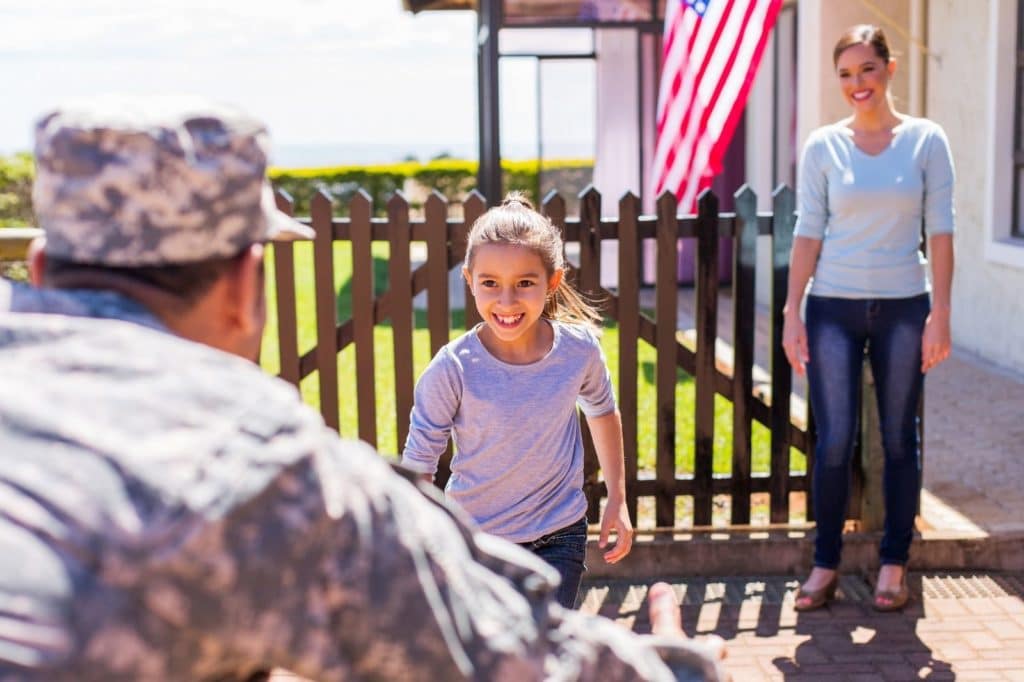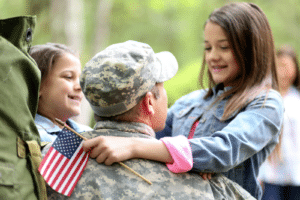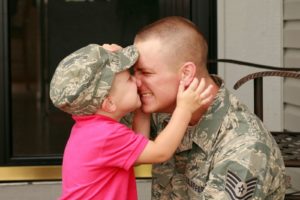With the overabundance of media outlets today, many adults have difficulty discerning the line between reality and fantasy, so it should come as no surprise when children experience these same feelings. And when the images show a nonstop barrage of war, shutdowns, terrorism and violence, a military child can experience anxiety, fear and confusion. They may not know that person in uniform on TV, but it’s someone who looks like Mom or Dad.
Military parents can help allay those negative feelings by talking to their children and validating their very real concerns.
The fear is real – and personal – for military kids
“Almost all children experience fears of one kind or another. This is a part of normal human development,” said Kenneth J. Graves, PhD. “Childhood fear becomes a concern when it gets in the way of engaging in normal everyday activities like going to school, playing with friends or engaging in daily activities at home with family.”
Graves, a clinical child psychologist with Child and Family Behavioral Health Services at Brooke Army Medical Center in San Antonio, said that military children often experience this fear more frequently and for longer periods than civilian children.
“Factors such as parent deployment and frequent transitions contribute to higher rates of problems such as anxiety and depression among military children,” he said. “Parents can help with fears. Talk with the child about the fear to understand specifically what they are worried about.”
You don’t have to have all the answers
While some parents are concerned that talking makes it worse, Graves said it helps the child to know that it’s okay to talk about their fears. Talking also helps to externalize the fear, making it something that can be worked on together rather than the child feeling all alone with their problem.
Sometimes children ask questions for which parents don’t have a ready answer. Graves said parents shouldn’t panic or feel inadequate when this happens, but use this as an opportunity to learn something new together.
“It also demonstrates to your child that you are not all-knowing, that you are okay with that, and that there are ways to problem solve when needed,” he said.
When Kate R.’s husband, Jake, deployed for six months to Afghanistan, she aimed for simple but truthful answers for her two children.
“Initially I said, ‘He’s at work,’ but even at their young ages they knew there was more,” Kate admitted. “So I said, ‘He’s working with people from all over the world to help people in another country defend against bad guys that are making trouble.’ We spoke about how blessed we were to live in the USA, and the privilege of serving others in the world. It was a great opportunity as a parent to instill a foundation of service.”
Pay attention to what your kids are viewing
Watching the news and seeing online stories about world events will make fears worse for children. Limiting and monitoring their TV and social media access can help ease their fears.
“Children can begin watching the news around the time they begin demonstrating an interest in what’s happening in the world around them,” Graves said. “This will vary by child. Early on, parents should watch the news with them so they can respond to concerns or worries the child might have regarding what they hear or see on the newscast.”
Kate said her children watched TV, but only entertainment geared toward their age levels.
“No news programs for them,” she said. “They had no interest in news or any real understanding that the news existed, despite my oldest remembering seeing daddy anchor the nightly news in Korea as a member of AFN (American Forces Network). Had they been older, I know things would have been different. In fact, both my kids now read the news extensively, by their own volition.”
Parents should also create opportunities for children to engage in more calming activities, Graves said, especially if the feared situation is one that the parent has limited ability to address or change in any way.
“It is for this reason that military children’s fears are often different from the fears of civilian children. Their parents may experience frequent and long deployments, often during which there is limited communication. This offers little opportunity for a child to talk to a parent as a means of quieting their fear. In addition, the at-home parent also has some fear and anxiety of their own which further contributes to the child’s fear and anxiety,” he said.
One way of addressing a child’s separation anxiety it is to bring them to a parent’s workplace, if allowed.
“It allows the child to have a better idea of where the parent is when they are not home. This can be especially helpful for children who have anxiety about a parent going to work,” Graves said.
The tough discussions about death
If a child is curious and has questions about death, Graves said the conversation should be tailored to their age.
“Prior to about 3 years old, children have virtually no understanding of death. Preschoolers may see death as temporary and, as a result, may experience confusion about the absence of a loved one,” Graves said. “School-age children usually understand that death is permanent.
“For younger children your response should be simple and straightforward,” Graves continued. “Children often deal with grief and loss inconsistently in that they may vacillate between appearing to be okay and having periods of sadness.”
“There were times I received the hard question, ‘Could Dad die over there?’” Kate said. “They were young enough that at that time I answered with a question: ‘What made you think about that?’ Usually it had nothing to do with the job, the threat … it was simple separation anxiety from not seeing him.
“Children at that age don’t quite understand death in the same way as us, and for them death could be described best as absence, and so absence might as well be death,” Kate continued. “This is the crux of so much separation anxiety. They just aren’t sure the parent is coming back! I usually redirected to comforting them over the length of the tour, and reassuring them that he was coming home sooner every day!”
Validate their fears and face them together
Kate said that validating her children’s sadness and fear was empowering.
“There were days that I didn’t want to deal with it; it was tempting to dismiss the fears, to be almost resentful of their innocence, knowing they didn’t really understand the danger and therefore didn’t warrant the fear like I did. It’s amazing how facing legitimate fears can both expand and crush your compassions,” she said.
“For the very rare moments when the threat of the ‘bad guys’ made them question, I would respond with a simple, ‘Everything has risks, and that’s why we prepare and make sure we are doing things wisely and safely, just like when we buckle into our car seats in the car, so dad is doing all those wise and safe things, too!’ It was very effective. Every time they made a ‘safe decision’ they felt the comfort of knowing they were being like dad, and in their minds, if they were okay because of it, he would be, too.”
Be aware of their feelings when the tour is over, too
Even an event that can be considered patriotic and positive, such as a surprise homecoming, can have adverse affects on a child. In 2014, the Military Child Education Coalition approached the Office of the Secretary of Defense and made a strong push to eliminate these types of reunions, citing issues with the children’s wellbeing. They had seen evidence of children being embarrassed, unprepared and lacking emotion.
“While a surprise homecoming can represent a special and memorable moment, it can also be very emotional and at times confusing for a child,” Graves said. “For that reason, I believe such homecomings should be private and not put on display. The presence of others watching likely makes the family feel a need to show certain expected emotions. Children need the freedom to react in whatever way they feel so that parents can see the real emotions and help them to deal with them. Homecoming is an extremely private and personal family moment that should be shielded from public display and scrutiny.”
Help is available for you and your family. Take advantage of these resources to build resilience and confidence in the military children in your life:
- FOCUS – Families Over-Coming Under Stress – provides resilience training to military children, families and couples. FOCUS can be found online and at nearly 30 U.S. Navy, Marine Corps, Army and Air Force installations. You can subscribe to a quarterly newsletter that offers tips on strengthening family skills.
- The American Academy of Child and Adolescent Psychiatry offers a Military Families Resource Center page.
- The Military OneSource website is a confidential Department of Defense-funded program that offers comprehensive information on every aspect of military life at no cost.
- Find support, inspiration and encouragement for military families on our Military page.










